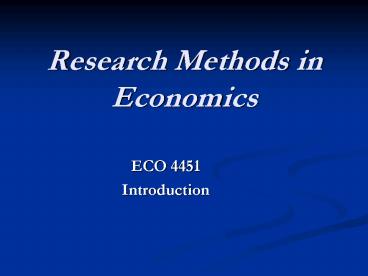Research Methods in Economics - PowerPoint PPT Presentation
1 / 18
Title:
Research Methods in Economics
Description:
What Is Economics Research? Defined as much by the way of thinking as by the subject matter. ... It's not related to economics. You care too much to be objective ... – PowerPoint PPT presentation
Number of Views:107
Avg rating:3.0/5.0
Title: Research Methods in Economics
1
Research Methods in Economics
- ECO 4451
- Introduction
2
What Is Research?
- Stating a question seeking its answer
- Evaluating a question and answer previously
considered by others - Synthesizing existing knowledge to develop an
answer (meta-study) - Discovering new knowledge knowledge is the
interpretation of facts (data)
3
What Is Economics Research?
- Defined as much by the way of thinking as by the
subject matter. - Microeconomics
- Behavior of individual agents
- Interaction of agents in market and non-market
settings - Optimizing behavior (choices)
- and responses to incentives
- Equilibrium
- and changes in equilibrium in response to
changing conditions
4
What Is Economics Research?
- Macroeconomics
- Aggregate behavior of economy or large segments
of it - Based on microfoundation of behavior of
individual agents their interactions
5
Your Research Project
- Assignment is to conduct an independent analysis
that seeks to answer a research question. - What does this mean?
6
Whats a Research Question?
- A good research question has several
characteristics, but fundamentally it is - A question, the answer to which is unknown or in
doubt.
7
Whats an Independent Analysis?
- You collect information or data needed to answer
the research question. - You apply a method of analysis that would
reasonably be expected to generate an answer
based on the information. - You evaluate the information
- Weigh the evidence
- Consider the quality or uncertainty of the
evidence - You draw conclusions supported by this analysis
8
Conducting an Independent Analysis
- The simplest way to conduct an independent
analysis is to choose a research question that
lends itself to a statistical test of a
hypothesis. - Less quantitative approaches make it harder to
- Credibly demonstrate independence of work
- Reach clear conclusions
- But non-quantitative approaches that seek to
answer a research question or solve a research
problem are acceptable, as long as the analysis
is your own.
9
Research Questions
- A good research question
- Is interesting and/or important from an economic
perspective - Is clearly stated
- Has a logical rationale is tied to economic
theory - Is doable but not trivial
10
Research Answers
- Research answers should
- Be clearly stated
- Supported by the analysis conducted
- Be generalizable
- Be put in context
- Have implications or generate new questions
11
From Questions to Answers The Research Process
- Good research
- Is incremental
- Is ethical
- Can be replicated
- Employs appropriate design analysis
12
Where Do Research Questions Come From?
- Provided by a client, clear doable.
- Provided by client, but vague /or undoable.
- Generated by researcher.
13
Finding a Research Question
- Start with a general area of interest refine to
a research question. - What interests you?
- Personal experience, topics from classes, current
events - Would this interest others?
- What have others done?
- Extend it, or do it in a different setting.
14
Finding a Research Question
- Is it doable?
- Not too broad, not more work than you can do,
data needed are available or can be acquired - Get a few ideas critique them
- Your first idea may not be the best, may need to
be refined significantly or even dropped
15
Common Errors in Project Selection
- Its not a research question
- Its a research question, but the analysis is
likely to degenerate into a report on rather
than an independent investigation of - Its not related to economics
- You care too much to be objective
16
Common Errors in Project Selection (Cont)
- The problem is too hard
- Any answer obtained could not be generalized
- Evidence to answer the question cannot be
obtained
17
Economics and Your Research
- Make sure that your topic is economic.
- When the economic part of your problem is not
obvious, be sure to clarify how the problem is
economic in nature - How it relates to the allocation of scarce
resources among competing ends.
18
(No Transcript)































